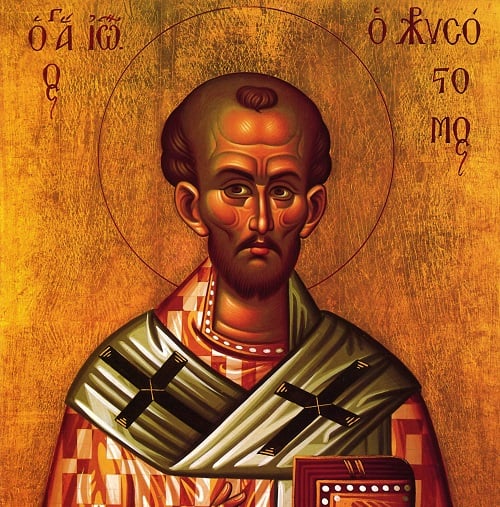Homily on Hebrews
4 February 2019Saint John Chrysostom is commemorated twice in January: on 27th, the translation of his relics, and 30th, as one of the Three Hierarchs. When he was nominated, without his knowledge, to become Patriarch of Constantinople, he had to be smuggled out of Antioch under armed guard, because he was so popular that the authorities feared civil unrest over his removal. Constantinople was a different matter. The clergy had quickly become accustomed to the prominent role the Church now played in public affairs and lived in inappropriate luxury. Saint John’s efforts to curb their lavish lifestyle were not welcomed. As an ascetic, he didn’t attend entertainments and didn’t throw sumptuous feasts, which was another way of commenting on the state of affairs in the imperial capital. And he quickly made an enemy of the wife of Emperor Arcadius, Eudoxia, by criticizing her extravagance and vanity. He was exiled, briefly, in 403, but soon recalled because of the public outcry over his treatment. But when he berated the empress in no uncertain terms over the erection of a silver statue to her, he was exiled again, this time for good. He died on his way to his final place of exile, Pityus, in modern-day Georgia. His final words were: ‘Glory to God, for all things’. Saint John was, indeed, ‘golden-mouthed’, and not at all ‘empty-mouthed’. As his final words show, he practiced what he preached, as is clear from this brief extract from his homily on Hebrews.

Let us bear all things thankfully, be it poverty, disease or anything else whatsoever. For he alone knows what is expedient for us. ‘For we do not know what we should pray for as we ought’ [Rom. 8, 26]. Because we don’t even know how to ask, unless we’ve received it from the Spirit, how can we know to ask what’s for our good? We should be sure to offer thanksgiving for all things. Let us bear all things nobly. Are we impoverished? Let’s give thanks. Are we sick? Let’s give thanks. Have we been falsely accused? Let’s give thanks. When we suffer affliction, let’s give thanks. This brings us closer to God and we even have Him in our debt. But when we’re thriving, it’s we who are debtors and who are liable to be called to account. When we’re prospering, we’re in debt to God. God will often bring down a judgement on us, which is payment for our sins. [Such judgments] draw down mercy, they draw down loving kindness, whereas [prosperity] raises us up to insanity and also leads to sloth. It inclines us to wish for greater things for ourselves and makes us arrogant. For this reason, the prophet also said: ‘It is good for me that you have afflicted me, Lord; that I may learn your statutes’. [Ps. 118, 71]….
Consider how many evils have often arisen because of wealth. Or rather, listen to what Christ says: ‘It’s easier for a camel to go through the eye of a needle than for the rich to enter into the kingdom of heaven’ [Matth. 19, 24]. Don’t you see how many good things wealth is a hindrance to, and yet you want to be rich? Aren’t you pleased that that obstacle’s been overcome? So the way leading to the kingdom is a narrow one, but wealth is broad, cumbersome and bloated. This is why He says: ‘Sell what you have’ [Matth. 19, 21]. Why do you yearn after wealth? This is why he took it away from you, so that you could be free of its slavery… Because the Lord cares for us, he delivers us from the harm that derives [from wealth].
So let’s not think that poverty’s an evil: sin is the only evil. Wealth isn’t a good thing in itself. The only good thing is to be well-pleasing to God. Let’s seek and pursue poverty. In this way we shall lay hold of heaven and attain to other good things, which may we acquire through the grace and lovingkindness of our Lord, Jesus Christ, to Whom, with the Father and the Holy Spirit, be glory, power and honour, now and forever and unto the ages of ages. Amen.
While history may not repeat itself, it nevertheless appears to be true that, because the human condition remains essentially the same in each generation, similar sets of circumstances are likely to produce the same result. Thus, after a period of repressive rule by the few, the many are likely to rise up in revolt. Just as Saint John stood up to the secular power in Constantinople in the early fifth century, so our hierarchs resisted Communist power and were persecuted in the Soviet Union in the 20th. Perhaps the most notable was Saint Luke, Archbishop of the Crimea, but another was the holy new martyr Onufry, Archbishop of Kursk and Oboyan, (feast-day May 19/June 1). Having graduated from seminary just before the Russian Revolution, his life as a servant of the Church was hard, with frequent arrests and exiles. Finally, on June 1, 1938 the holy hierarch was martyred by firing squad along with Bishop Anthony (Pankeyev) of Belgorod and another fifteen representatives of the clergy. In March 1936, just before his final exile, he had written to his mother: ‘I thank the Creator for all things!’






